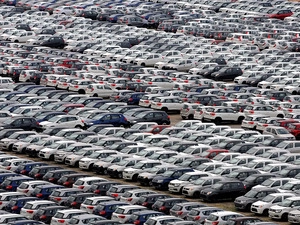Automobile retail sales in slow lane in May: FADA

The retails in COVID-hit May 2021 and May 2020 stood at 86,479 units
Retail sales of automobiles trebled last month, in line with wholesale dispatches, albeit on a low base as operations stood disrupted due to the outbreak of the second wave of the pandemic in May 2021.According to data available with vehicle retailers body Federation of Automobile Dealers Association (FADA) as many as 1,646,773 vehicles were retailed last month, compared to 536,795 units in the same period last year. Sales, however, were lower by around 10% when compared with the pre-covid month of May 2019.Automakers in India report wholesale dispatches from factories and not retail sales to customers. Registration numbers are hence used as a proxy. FADA President Vinkesh Gulati informed registrations went up across categories last month, on a low base as retail sales in May 2020 and May 2021 were low on account of the first and the second wave of the pandemic. “Indian auto industry during May 2022 continued its flattish run for the third consecutive month. While YoY comparison with May 2021 shows exceptionally healthy growth rate across all categories, it is important to note that both May 2021 and May 2020 were affected by the nationwide. For even as retail sales of passenger vehicles and tractors grew by 11.40% (to 263,152 units) and 33.09% (to 52,487 units) when compared to May 2019; registrations of two-wheelers, three-wheelers and commercial vehicles are yet to turn green as these categories were down by -13.91% (to 12,22,994 units), -19.32% (to 41,508 units) and -11.44% (to 66,632 units), respectively.Gulati said the government’s move to reduce excise duty on fuel will help tame inflation and boost vehicle sales, especially those of two-wheelers. But the increase in third party insurance premiums is likely to act as a dampener for motorcycle and scooter buyers in coming forward and concluding their purchase decision.Gulati informed, “The two-wheeler segment has seen slight improvement in overall sales when compared with April’22. While two-wheeler EV sales were growing rapidly though on low base, various fire incidents across almost all EV brands have created a fear in the mind of the customer. This coupled with supply chain issues, has decreased two-wheeler EV sales drastically from last month.”The data was put together by FADA from the VAHAN platform of the Ministry of Road Transport and Highways (MoRTH). VAHAN captures data from 1,481 out of 1,616 RTOs in the country. FADA said with the Andhra Pradesh Transport Ministry migrating to the VAHAN platform, the data reflects registrations from 91.6% RTOs in India.But even as demand remained strong in the passenger vehicle segment, Gulati cautioned with the Russia-Ukraine war and covid-induced lockdowns in China, the global auto industry continues to witness supply disruptions, especially of semi-conductors. The RBI too has warned of more inflation as the increase in wholesale prices will get passed to the consumer thus decreasing his/her disposable income. RBI’s observation has come at a time when WPI Index rose by record 15.1% in the wake of high commod ..Customers in the passenger vehicle segment will continue to witness long waiting periods due to supply issues. Average inventory for passenger vehicles currently ranges from 15-20 days, as against the norm of 30-45 days. “Healthy booking and single digit cancellation show that demand may stay put even when normal supply resumes in months to come”, said he.
Source: https://economictimes.indiatimes.com
Tags :
Previous Story
- Honda to spend ¥5 tril over next decade...
- Jeep India positive about auto sector outlook; to...
- Nvidia’s next-generation self-driving toolkit is available for 2024...
- GM-backed Cruise seeks final approval to commercialize robotaxis...
- New Mazda cars will stop if driver suffers...
- Toyota ranked one of worst major automakers for...
- Sales in AI Virtual Visor Market to Pick...
- Supply Chain Volatility in the Automobile Industry